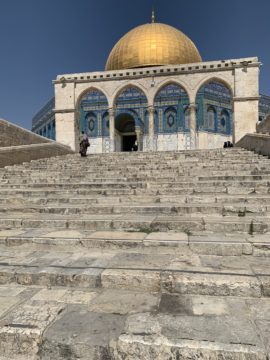by Shadab Zeest Hashmi Masjid Al Aqsa, or The Far Mosque of Jerusalem, as the Quran calls it, is emblematic of the spirit of compassion and transcendence for Mevlana Rumi. “A heart sanctuary,” in the words of Rumi in his poem “The Far Mosque,” Al Aqsa represents a conquest over the egoistical desires of dominance, greed, vanity, violence and supremacy. It is held together by the sacred energy of merciful love, even “the carpet bows to the broom/the door knocker and the door swing together/like musicians.”
Masjid Al Aqsa, or The Far Mosque of Jerusalem, as the Quran calls it, is emblematic of the spirit of compassion and transcendence for Mevlana Rumi. “A heart sanctuary,” in the words of Rumi in his poem “The Far Mosque,” Al Aqsa represents a conquest over the egoistical desires of dominance, greed, vanity, violence and supremacy. It is held together by the sacred energy of merciful love, even “the carpet bows to the broom/the door knocker and the door swing together/like musicians.”
There is an expansiveness in Rumi’s poem that mirrors the place. I recall the embrace of the silent hours as I sat on the russet prayer carpets of Al Aqsa a few years ago– the wide doors, stained-glass windows, voices of children braided with the rhythmic recitation of the Qura’n, the scrawny birds covered in holy dust, stones sculpted by mythic time. I also recall stepping out of one of the fifteen gates of Al Aqsa, into a scene from a war movie, IDF soldiers with guns in all the storied alleys, and all the thresholds of sacred sites.
Jerusalem is no heart sanctuary. It is “the bitterness of two hundred winter-bare olive trees fallen/in the distance,” as a line from a poem by the Palestinian-American poet Deema Shehabi says. Her poem “In the Dome of the Rock” haunts me; it reflects the soul of Palestine, the soul of Al Aqsa, the guardian that has given this site of ascension its very blood. Shehabi continues with the unforgettable persona: “her exhausted/scars will gleam across her overly kissed forehead. She will ask you to come closer, and when you do,/ she will lift the sea of her arms from the furls/ of her chest and say: this is the dim sky I have/ loved ever since I was a child.”
How many children, how many mothers have we seen among the mercilessly killed, the maimed, the sole survivors of entire families who have been exterminated. The death toll is nearing 20,000 within two months, counting those who cannot be rescued from the rubble. Throughout the past weeks, I wake up every day horror-struck, heartsick over the unceasing slaughter. In this gut-wrenching time, children breathe their last under tons of debris, or emerge with purpled bodies, amputated limbs, or are wrapped in shrouds and held in the farewell embrace of tormented parents.
In dreams I try to climb the ancient stairs to the Dome of the Rock, surrounded by the light made golden by the worshippers, but the most beautiful souls reign over the hallways and courtyards, ablution fountains, gardens and mosques of Al Aqsa; the ghosts of the martyrs, all light and unmatched grace. It is enough to be lowered and lifted by this scene of secondary witness. The truest witness is at the center, the being of the martyr or “shaheed” which is another word for “witness.”
These are gruesome days of genocide in the holy land; I am dumbstruck by the scale of brutality by democracy-waging countries, the extent of silencing and censorship by the flag-bearers of free speech, and I am utterly humbled by the nobility of spirit and courage of even the most vulnerable of the Palestinian victims.
I keep turning to the majesty and peace within Al Aqsa. At a recent zikr session, Kabir Helminski, Sufi Sheikh and one of the best-known translators of Rumi, explained beautifully how the one closer to the spirit of the faith is winning the war in Gaza.
Rumi, the poet of humanity, is more specifically the poet of the true Islamic ethos and by extension, of all Abrahamic faiths. In this poem, he brings to our attention, not only the sanctuary of our hearts, the true abode of the Divine, but also the role of the earthly ruler, the “prince”– a poem that yields wisdom for all times, and is especially poignant in this moment.
The Far Mosque
The place that Solomon made to worship in,
called the Far Mosque, is not built of earth
and water and stone, but of intention and wisdom
and mystical conversation and compassionate action.
Every part of it is intelligent and responsive
to every other. The carpet bows to the broom.
The door knocker and the door swing together
like musicians. This heart sanctuary
does exist, though it cannot be described.
Solomon goes there every morning
and gives guidance with words,
with musical harmonies, and in actions,
which are the deepest teaching.
A prince is just a conceit,
until he does something with his generosity.
-Mevlana Jalaladdin Rumi
Read Deema Shehabi’s poem here: https://perugiapress.org/2023/11/emerging-biwoc-poet-spotlight-39/?fbclid=IwAR1N6L0FpEPnlZf7Cwc5LVkmfjzoObTD8YaEWlOf2mtJpqurAvFJXruJ76c
Deema K. Shehabi: “In the Dome of the Rock” Thirteen Departures from the Moon, Press 53, 2011
Rumi, Translated by Coleman Barks, with Arberry, Nicholson and Moyn: “The Far Mosque” The Essential Rumi, the Expanded Version, Blackstone Publishing,
